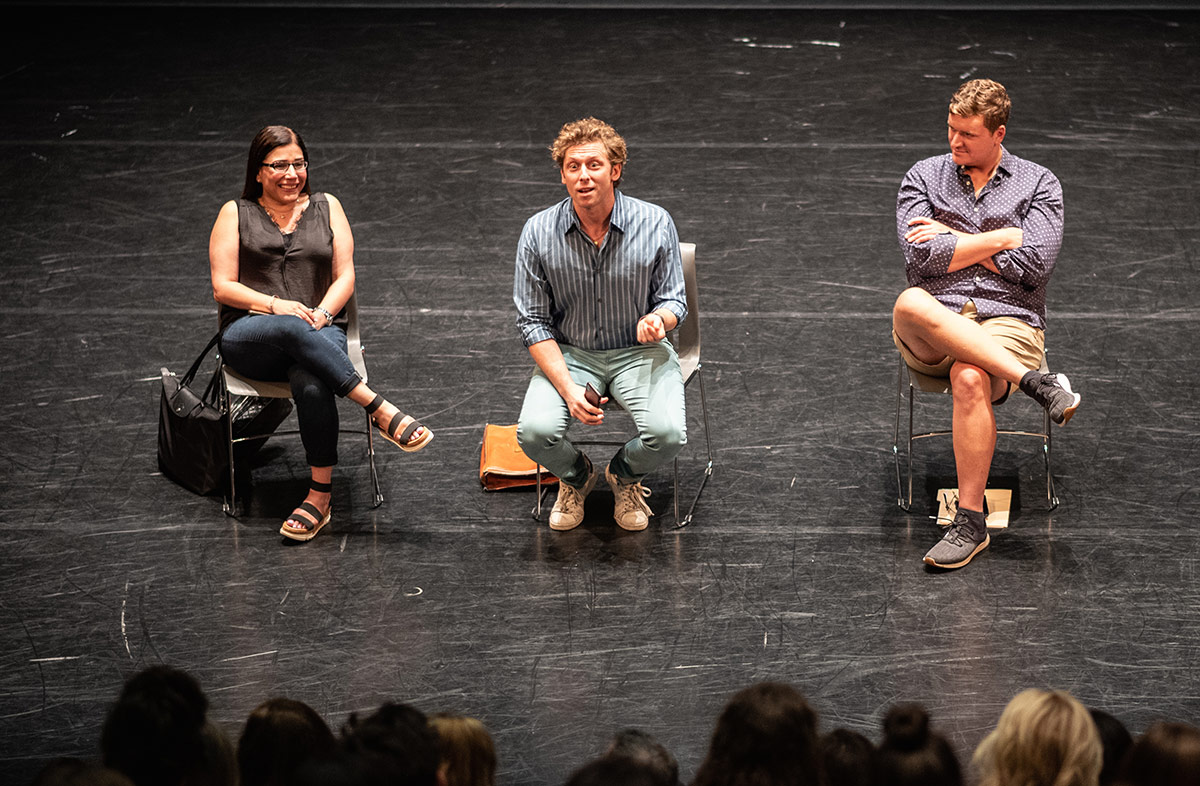The weather outside is frightful, to quote Sammy Cahn and Jule Styne, and it’s time to get serious about your vocal health. As you approach the heat (or cold) of audition season, start treating your voice with a heavy dose of self-care. Between auditions, rehearsals, performances, everyday life, and more auditions, you may use your voice quite a bit in a day. Everyone has their limits – I’m here to help you manage them. For prospective musical theatre students, your vocal folds, or cords, are invaluable to your singing. For actors, your voice is one of your most useful tools as a story-teller. Versatility and flexibility means treating your instrument with TLC. So how do you keep your voice healthy and ready to go? Keep reading to find out.
Singing in the Rain!
There are so many ways to maintain a healthy voice via some good ol’ H2O. Do you have thick phlegm when you wake up that makes it harder to sing in the morning? Water helps decrease the viscosity by breaking down that phlegm, making it easier for your vocal folds to do their thing in your early morning audition. Note: viscosity defines a fluid’s resistance to flow. Think of it this way, honey has a higher viscosity than water.
Drinking 8-10 glasses of water a day can truly do wonders. It can take up to a few hours for water to reach the vocal folds, so make sure to invest in a personal steamer.
Steamers are not only great for moistening your vocal folds, but they are also easy to travel with to non-local auditions! I would suggest finding one that uses fine mist to provide more hydration to your sinuses and vocal folds.
Get a humidifier! A humidifier adds moisture to the air. I like to sleep with my humidifier on, especially in the winter, when it can get cold and dry. This is not just because of the weather outside, but the heat you turn on inside, as well. It is important to remember to keep the humidifier clean and to replenish it with new water after every use.
Warm Up AND Cool Down
Warming up your voice before singing is a necessary responsibility of all professional singers and will help with stamina and endurance. Semi-occluded vocal tract exercises (say that five times fast!), or SOVT exercises, are my favorite tools when warming up my voice. *For the voice nerds out there, check out the extra note below.*
Believe it or not, it’s very likely that you have used one or more of these exercises to warm up. Some of my favorites include lip buzzes/trills, raspberries, and straw phonation.
Try this exercise:
In your head voice, sing a five-note descending scale (5-4-3-2-1) blowing into a straw in a water bottle. You may try pinching your nose to make sure all of the air is going through the straw. Now try the same exercises on a lip buzz/trill or a raspberry (tongue out). Notice any differences? This is one great way to ease your voice into singing for the day. It is also helpful to warm up your body and you can kill two birds with one stone by warming up your body and voice at the same time. For example, try singing beautiful soprano sounds while rolling down and touching your toes, with your knees slightly bent or, for more advanced stretchers, in downward dog. Belt sounds often feel great in a strong position like a squat or a lunge. After a long day of using your voice, make sure to get in a good vocal cool down. This can be similar to your warm up! The key is making gentle, but resonant, sounds in a very comfortable range to allow your voice to relax. This will help with rebound and recovery time for that ten o’clock rehearsal the next day. Give it a shot!
[*Whenever you are blocking off the vocal tract (from your mouth to your throat), you are doing an SOVT exercise! Wanna know more? When your mouth is partially closed, the increased back pressure allows the vocal folds to line up better, avoiding a pressed quality. The vibrational amplitude, how far apart the vocal folds move when vibrating, and collision force, the forces applied to the tissues as they collide, of the vocal folds changes. It keeps the vocal folds from coming together as aggressively. In short, this means more ease and less effort!]
Ready, reset, go!
Vocal resets are a great tool to help you release tension and free up your voice. A short amount of time can have a large impact on staying in vocal shape! My favorite vocal resets are the blowfish and the puppy whimper.
Try this exercise:
Puff your cheeks out while keeping the tip of your tongue behind your bottom teeth. Slowly, blow air out through a small opening in the front of your lips. Now, add sound. It should sound like a cross between a ‘w’ and a ‘v.’ Glide from low to high and high to low on this kazoo like sound a few times and you are doing the blowfish! My second favorite reset, the puppy whimper, involves some of those acting skills. Start by making your best melodramatic frown. Now, in your head voice, gently hum to create a short, descending whimper, as if your human is ignoring you. To help, lower your jaw slightly and imagine the sound is coming out of the top of your head. If this is too tricky to do in your head voice, try it in your mid-ranged chest voice. Throughout the day, vocal resets like these will keep you feeling stretched and free of vocal tension!
Quality rest is for the best
We all occasionally underestimate how important good quality sleep can be. Yes, get your eight hours of sleep each night, but you also need to rest your voice when you are awake! You know your voice better than anyone. If you’re feeling vocally tired after a rehearsal, audition, or performance, take a break. It may be too much to sing “Santa Fe” four times in a row full out in your ten hour tech rehearsal. When rehearsing for a school show, your music director might not be thinking about all of the singing you do outside of rehearsals. Have a conversation with them to reach an understanding and to establish marking techniques to keep your voice in tip-top shape (i.e. singing in an easier vocal register).
You should also be aware of how much you use your voice in between auditions such as Unifieds. I know we’ve all had the urge to run over to a friend to share your latest audition story, but this is valuable time. Relax, grab some water, and do a silent activity (i.e. listen to a podcast, read, go over music, etc).
When all is said and done, this rest can truly lead you to success!
Write it Down!
Start keeping a vocal journal. It’s important to keep track of how much you are using your voice each day and then compare that to how your voice feels at the end of the day. More demanding usage of your voice includes rehearsals, performances, and having loud conversations. Tip: a portable microphone headset with a speaker is a great tool if you work at a loud job (i.e. gymnastics coach, dance teacher).
Less demanding usage of your voice includes normal conversations, going through SOVT vocal exercises (see above) and going through your script lines. How does your voice feel at the end of the day? How does it sound when you wake up tomorrow? Take note of any patterns and find the routine that works best for you and your voice!
Wrapping It Up
Checking in with your voice teacher is always helpful in evaluating vocal health throughout audition season. A second set of ears can never hurt. However, it is important to maintain a routine on your own. Therefore, these tips, tricks, and tools can help guide you toward maintaining a healthier voice and a healthier you! You owe it to yourself to let all of your hard work pay off by keeping your voice in great shape. Happy singing!
About the Author

Zach Miller is a professional actor and voice teacher currently living in Jersey City. He holds a B.F.A. in musical theatre from Penn State University. There, he also studied voice pedagogy with a focus in Bel Canto/Can Belto, a cross-training technique for singing in musical theatre. Zach appeared in the national tour of Anything Goes and completed a long run as the vocal captain and lead vocalist with Celebrity Cruises. He has worked at regional theatres including Pittsburgh CLO, Music Theatre of Wichita, West Virginia Public Theatre and The Connecticut Repertory Theatre. He is a member of the performing groups “The FlyBoys” and “NYC3,” where he tours the country, on land and sea, singing a wide variety of pop/rock music with a twist. Zach is a proud member of AEA, NATS, and The Voice Foundation. Zach is currently on the voice faculty at Molloy University/CAP21 and has previously taught voice at Cornerstone Music Studios and Lincroft Music Studios. His students have been accepted to high school performing arts programs and B.F.A. programs in addition to working in regional, national touring, and Broadway productions. He looks to encourage his students to develop their own fully energized, balanced, and supported sound. www.zachmillervoicestudio.com




